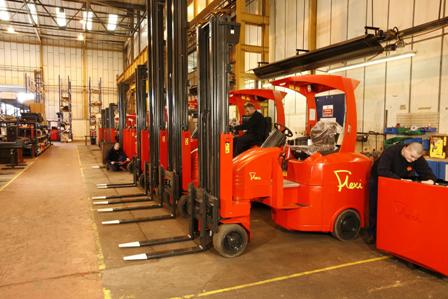
While official figures are as yet unavailable, anecdotal evidence suggests that so far in 2009, UK reach trucks sales have stood up better than sales of other forklift types - such as, for instance, counterbalance trucks. This may be due to the relative resilience of the grocery retail market which has continued to prosper throughout the recession.
However, John Maguire, sales and marketing director of Narrow Aisle Flexi, believes that, with warehousing costs under ever closer scrutiny, the reach truck market is under pressure from the continued growth in articulated truck sales.
"Although articulated trucks were first introduced as an alternative to established guided very narrow aisle technology, the articulated truck concept is now regarded a highly credible alternative to reach trucks in more and more applications and articulated forklifts are proving more productive than reach trucks in many situations," he says.
According to John Maguire, recent developments and improvements in articulated truck design are leading many companies to opt for articulated machines in place of reach trucks - not just as a way of saving space but as a way of improving productivity.
One of the key drivers behind many companies choosing to switch to articulated trucks, is the speed at which an articulated truck can pick and put away palletised loads.
In simple terms, a reach truck uses either a pantograph type mast - which, with its scissors-like mechanism extends its forks forward from the mast to place or retrieve a pallet - or a moving-mast which rolls forward for pallet placement and retrieval into or out of the racking and to place a pallet on the floor.
An articulated forklift on the other hand is designed to enter an aisle with the palletised load to the front. The Flexi truck then articulates through 95 degrees before placing the forks into the racking or collecting a pallet. In practice, users of the articulated truck concept know that this allows pallets to be picked and put away notably faster than with a reach truck.
"The fact that an articulated truck does not have to waste time reaching and driving in and out of the racking to retrieve a pallet makes for a far more efficient work cycle," says John Maguire.
He continues: "At Narrow Aisle, we have recently undertaken tests to compare the picking efficiency of a reach truck with an articulated truck. During a typical work cycle over a one hour period a reach truck will move 25 pallets while, over the same time doing the same job, a Flexi articulated forklift will move 35 loads."
"It is true that a modern reach truck can reach a higher maximum travel speed than a Flexi - typically around 12 kph to a Flexi's 10 kph - but our customers know that the Flexi's work cycle is notably more productive. Of course, with space constraints and health and safety requirements, a reach truck's maximum travel speed is rarely reached or, in many cases, the truck's speed is electronically restricted."
John Maguire adds: "It is also worth considering that, most reach trucks have hard polyurethane tyres and are designed for use within racking only and are not suitable for loading trucks outdoors.
"Historically, the articulated truck has been promoted as a viable alternative to the traditional combination of a counterbalanced truck to unload and a reach or VNA truck to put away palletised loads. This was thanks largely to the articulated truck's ability to work in narrow aislesways and operate both inside and outside a store.
"But, as more users become aware of the very real productivity benefits that Flexi articulated trucks deliver, many of the mainstream forklift truck producers will readily admit - privately at least -that articulated forklifts are having a significant impact on reach truck sales both in the UK and overseas. This trend is likely to gather momentum."